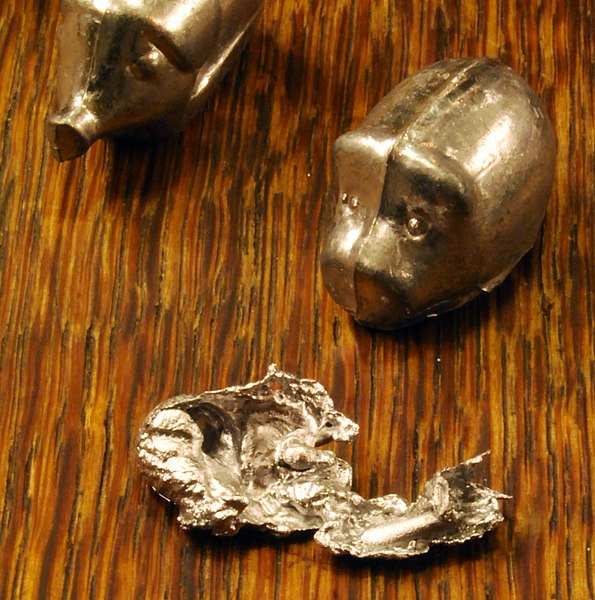On Tap in Germany in 2018: Water and Self-Loathing
The molten lead has spoken!

This is how Germans predict the future. In your 2018: a single dried-out pant leg? Photo: Micha L. Rieser
There are two primary methods of ringing in a new Gregorian year in the German-speaking world. One is to set off as many class-B pyrotechnics on residential urban sidewalks as possible. The other is something called Bleigießen (BLY-gee-sun), where, I am not shitting you, you drop molten lead into water and then whatever shape that lead assumes when it solidifies is what the new year will bring you. (Spoiler alert: the answer is always “lead poisoning.” Unrelatedly, most people actually use tin now for some reason.) What you won’t see as much of in the Deutsch world is a massive ill-conceived bum rush to the gym on January 3, or two million new subscriptions to whatever the latest bullshit weight-loss fad is.
Germans are more comfortable with their own faults and flaws, largely because it is a proven scientific fact that if a German can’t criticize at least fourteen things per day, about both himself and others, he will wither up and disappear. As such, their gute Vorsätze fürs neue Jahr (GOO-tuh FOR-setz-uh foooors NOY-uh YAH), literally “good intentions for the new year,” are generally more reasonable than, say, mine, which I have already broken before finishing this sentence: Stop Eating Feelings and Never Use Facebook Again. I mean, here is a site literally called “utopia.de” and their utopian idea of a New Year’s Resolution is “drink tap water.”
The grand paradox of Germanness is, of course, that if you ask any German what it’s like to be German, they will reply with an uninterrupted litany of woes and grievances. If you reply with, But wait, your country is literally the most admired in the world and also the leader of it provided that you come up with any sort of functioning government, they will shrug almost imperceptibly, which is German for Well that goes without saying, chump.
Make no mistake: Germans know they are better than you, but one of the reasons they are better than you is that it is intrinsic to their cultural character never to say that out loud. Indeed, the opposite is the case: It is intrinsic to Germany’s greatness to be perpetually disappointed in itself.
This brings me to this New Year’s column in Der Spiegel by famous German journalist-pundit Jakob Augstein—who, fun fact, also happens to be the son of the late Spiegel co-founder and publisher Rudolf Augstein, but allegedly really the biological son of postwar novelist Martin Walser. (Like, imagine if the NYT’s new child publisher A.G. Sulzburger found out his real dad was Jonathan Franzen.)
Anyway, Jakob Augstein runs his own publication, Der Freitag, which is a left-leaning weekly, and he has SOME ISSUES with Germany today, people.

Happy German Festivus! You’re all a disappointment. Screengrab: DER SPIEGEL
Here’s how Augstein starts his “good intentions” for 2018:
A new year for the BRD—the Banana Republic of Deutschland. You think that’s overblown? Because Germany, amidst all the countries of this world, is the shining example of order and cleanliness? And because everything works so great here? If that’s the way you see it, then that’s just because your expectations, like this whole country’s, are way too low.
The word he uses to describe the German tendency for both low expectations and financial frugality is Genügsamkeit (guh-NEWG-zom-kite), which literally translates to “enough-i-ness.” Germans take pride, he says, in being genügsam, “enough-y,” in saying, essentially, I have enough crap and I don’t need any more. But, Augstein cautions, “when an entire society is too frugal [enough-y], it can end badly.”
To illustrate the perils of enough-i-ness, he points to five areas in which he believes Germany is inexcusably FUBAR: public safety, technology, education, transportation, and what he describes as “injustice” but actually means economic inequality.
To demonstrate Germany’s dangerousness, Augstein refers to unfortunate events in Cologne and Berlin—neither of which, it maybe warrants pointing out, were repeated—as well as a series of early-aughts murders by a far-fight terrorist group called the National Socialist Underground, whose surviving “mastermind,” Beate Zschäpe, finally concluded her trial this past summer.
All right, I agree, none of those events is fantastic—but, speaking of extremely low expectations, it’s hard to cry about Germany’s public safety issues from a country so used to multiple-casualty mass shootings that they often get pushed off the front page within an hour of occuring. Similarly, it’s tough to get on board with Augstein’s evisceration of the German public school system (his evidence: “every parent of school-age children knows” about it) when I live in a country where a good portion of the citizenry openly believes that the answer to all of education problems is to have Walmart run our schools.
Again, yes, I understand that Augstein is comparing Äpfel to Äpfel, so to speak, and he never asked me to bring my rotten American oranges into his picture. But, not to Carrie Bradshaw the situation, I Can’t Help But Wonder if one of the reasons that Germany is consistently so admired in the world is precisely because of the way they set about to accomplish their “good intentions” for themselves and their country: Namely, they pair realistic, humble expectations of themselves with a rigorous critique of the ways their state has come up short.
It remains to be seen whether Mutti’s molten lead has formed into the shape of a functioning government. But one thing is certain: No matter who is in charge in Germany—and no matter how on-time the buses run—someone will be there to make sure that the country doesn’t go getting a big Kopf and thinking it’s the großartig-est.
The word that Jakob Augstein uses to chide the Germans for having low expectations is anspruchslos (AN-sprooks-lows), which, like genügsam, has multiple applicable meanings. Unambitious is one, yes, and probably what Augstein wants to convey—but it also means modest and unpretentious. It is, indeed, a quality that many in American seats of power could probably use—especially since expectations that they might acquire some much-needed enough-i-ness are about as anspruchslos as they come.
